SSDI Appeal Process Step-by-Step
- Last Updated: July 14th, 2025

Attorney Jessica Paluch-Hoerman, founder of TruLaw, has over 28 years of experience as a personal injury and mass tort attorney, and previously worked as an international tax attorney at Deloitte. Jessie collaborates with attorneys nationwide — enabling her to share reliable, up-to-date legal information with our readers.
Legally Reviewed
This article has been written and reviewed for legal accuracy and clarity by the team of writers and legal experts at TruLaw and is as accurate as possible. This content should not be taken as legal advice from an attorney. If you would like to learn more about our owner and experienced injury lawyer, Jessie Paluch, you can do so here.
Fact-Checked
TruLaw does everything possible to make sure the information in this article is up to date and accurate. If you need specific legal advice about your case, contact us by using the chat on the bottom of this page. This article should not be taken as advice from an attorney.
Key takeaways:
- The SSDI appeal process involves four main steps. By following these steps and providing strong evidence, applicants can increase their chances of a successful appeal for disability benefits.
- The ALJ hearing offers the highest likelihood of approval (around 50%). You can prepare for this step by submitting new medical evidence, providing a clear explanation of how the disability affects the ability to work, and more.
- TruLaw can assist you after a denial by reviewing the case, preparing you for the ALJ hearing, identifying errors in the SSA's decisions, and filing a SSDI lawsuit in federal district courts if necessary.
Overview of the SSDI Appeal Process
On this page, we’ll provide an overview of the SSDI appeal process, SSDI hearings before an Administrative Law Judge (ALJ), common challenges in the SSDI appeal process, and much more.
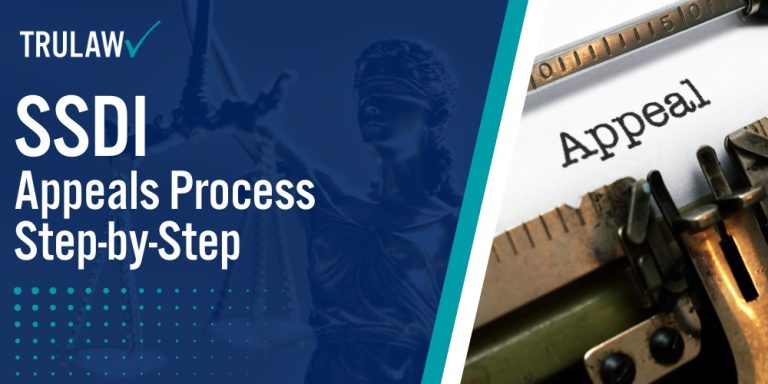
Intro to the SSDI Appeal Process
The SSDI appeals process follows these four (4) main steps:
- Reconsideration: This is the first level of appeal, where your application is reviewed by someone who was not involved in the initial decision.
- ALJ Hearing: If your reconsideration is denied, you can request a hearing before an Administrative Law Judge (ALJ).
- Appeals Council Review: If the ALJ denies your claim, you can ask for a review by the Social Security Appeals Council.
- Federal Court Review: If the Appeals Council denies your claim or refuses to review it, you can file a SSDI lawsuit in a federal district court as the final step in the appeals process.
If you or someone you love has been denied social security disability benefits, you have the right to appeal the Social Security Administration’s decision within 60 days.
Contact TruLaw using the chat on this page today to receive an instant case-evaluation and determine your eligibility to file a SSDI lawsuit in a federal district court today.
Table of Contents
First Steps in the SSDI Appeal Process
After receiving an initial denial of your Social Security Disability Insurance (SSDI) application, it’s important to understand the reasons behind the rejection and gather the necessary documentation to begin the appeal process.
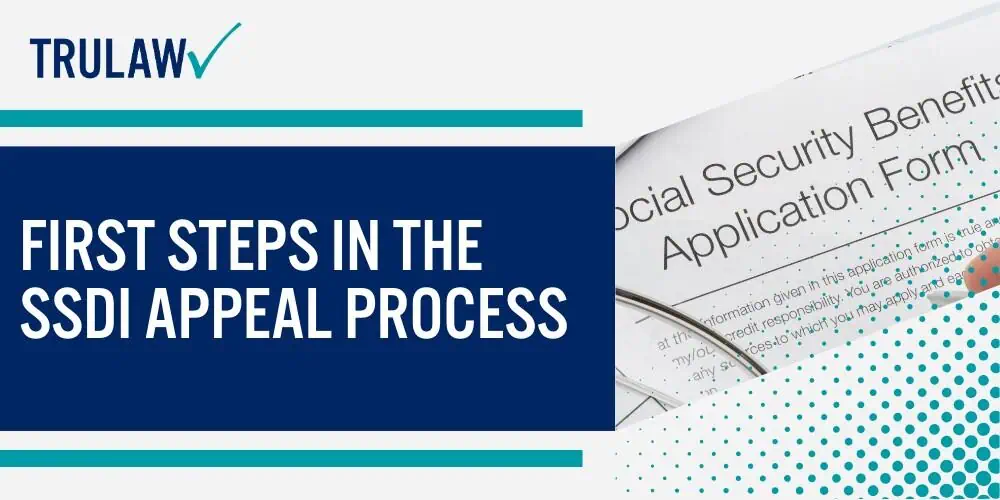
By taking prompt action and following the proper steps, you can increase your chances of a successful appeal for disability benefits.
Reasons Your SSDI Application May Be Denied
The Social Security Administration (SSA) may deny your initial social security disability benefits application for various reasons, such as insufficient medical evidence, failure to meet non-medical requirements, or the determination that your disability does not prevent you from working.
Carefully review your denial letter to identify the specific reasons for your application’s rejection, as this information will guide you in strengthening your appeal.
Documentation Required for the SSDI Appeal Process
Collecting and submitting relevant documentation is important when initiating the SSDI appeal process.
This step ensures that you provide the SSA with all the necessary information to reconsider your case and potentially overturn the initial denial.
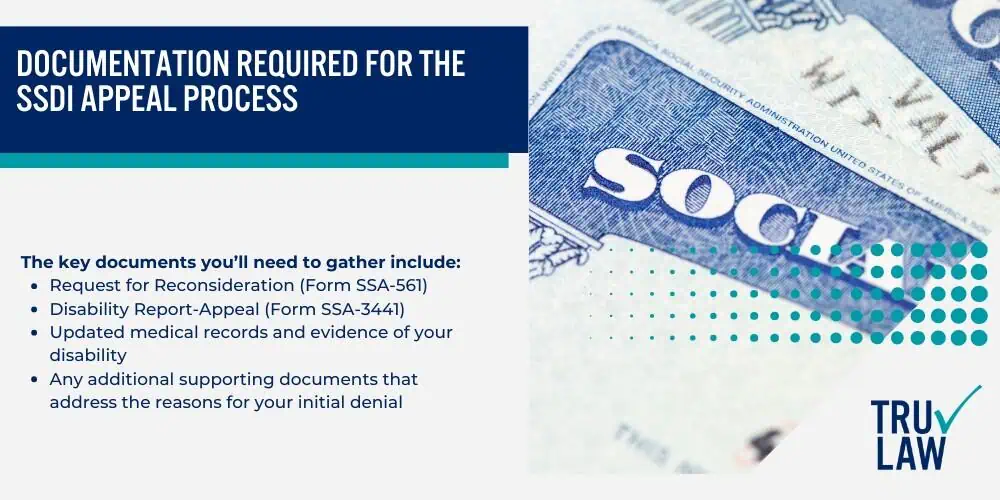
The key documents you’ll need to gather include:
- Request for Reconsideration (Form SSA-561)
- Disability Report-Appeal (Form SSA-3441)
- Updated medical records and evidence of your disability
- Any additional supporting documents that address the reasons for your initial denial
By providing comprehensive and up-to-date information, you can build a stronger case for your SSDI appeal.
Make sure to submit these documents within the specified timeframe to avoid any further delays in the appeal process.
Reconsideration Phase in the SSDI Appeal Process
The first level of appeal is the reconsideration phase, during which a different claims examiner at Disability Determination Services (DDS) will review your application and any new evidence you provide.
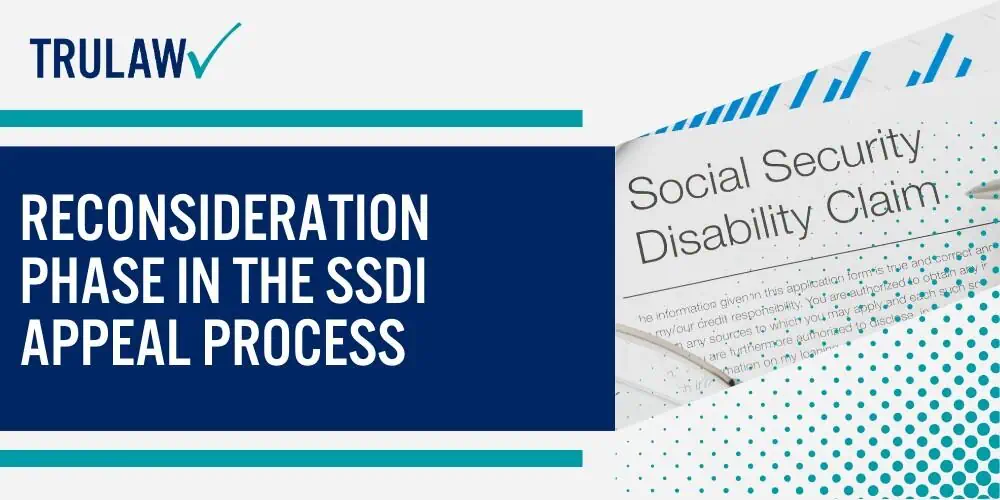
This stage presents an opportunity to bolster your case and address the issues that led to your initial denial.
What to Expect During the Reconsideration Stage
During the reconsideration stage, a new examiner will thoroughly review your initial application, along with any additional evidence you submit.
The examiner may also request more information or require you to attend a consultative examination with an SSA-appointed medical professional.
It’s important to cooperate fully with these requests to avoid further delays or denials.
Tips for Strengthening Your SSDI Reconsideration Appeal
Strengthening your SSDI reconsideration appeal is important to increase your chances of success at this stage.
By taking a proactive approach and ensuring that your case is well-supported, you can improve your odds of having your initial denial overturned.
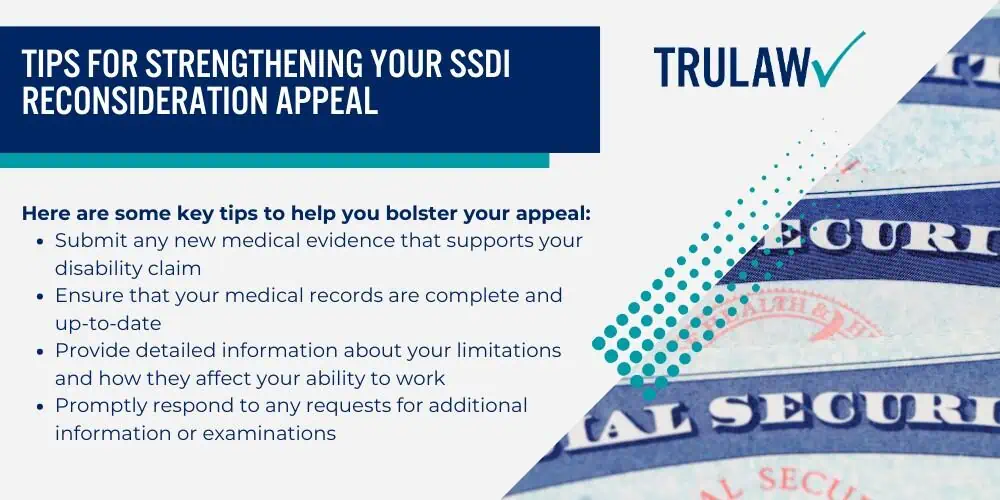
Here are some key tips to help you bolster your appeal:
- Submit any new medical evidence that supports your disability claim
- Ensure that your medical records are complete and up-to-date
- Provide detailed information about your limitations and how they affect your ability to work
- Promptly respond to any requests for additional information or examinations
While the approval rate at the reconsideration stage is relatively low (around 15%), a well-prepared appeal can lay the groundwork for success at later stages of the process.
By following these tips and working closely with your healthcare providers and legal representatives, you can give yourself the best possible chance of a favorable outcome.
SSDI Hearings Before an Administrative Law Judge (ALJ)
If your claim is denied at the reconsideration stage, you can request a hearing before an Administrative Law Judge (ALJ).
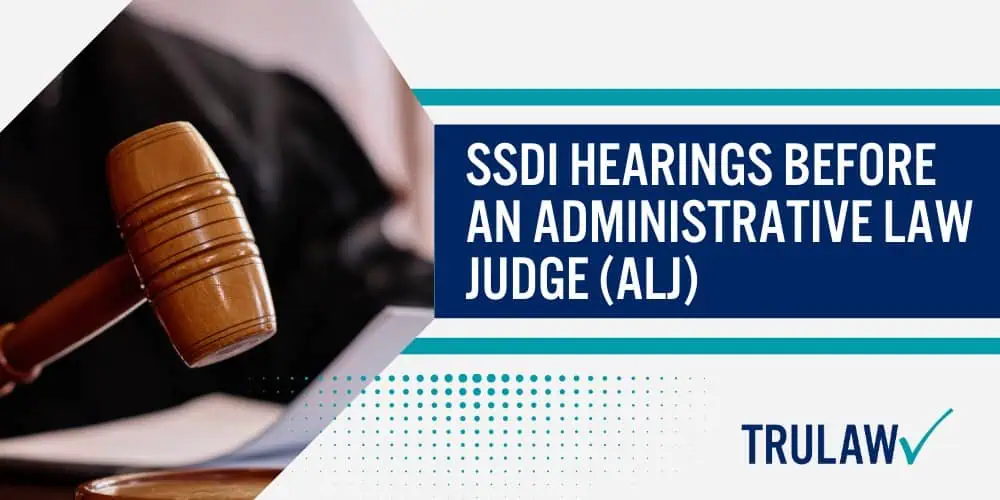
This stage offers the highest likelihood of approval, with around 50% of cases being decided in favor of the applicant.
Preparing for Your SSDI Hearing: Key Steps and Best Practices
Thorough preparation is important to maximize your chances of success at your ALJ hearing.
By gathering strong evidence, presenting a clear and compelling case, and seeking the guidance of an experienced SSDI attorney, you can significantly improve your odds of a favorable decision.
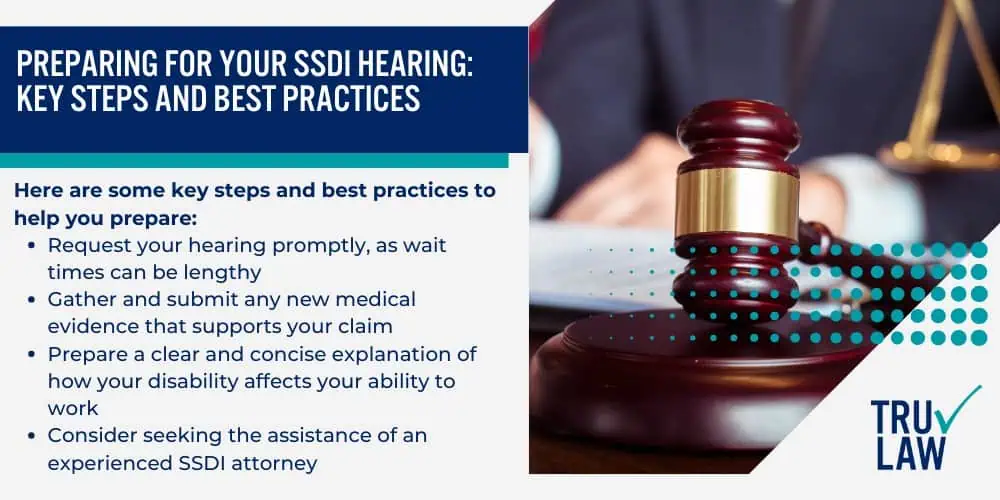
Here are some key steps and best practices to help you prepare:
- Request your hearing promptly, as wait times can be lengthy
- Gather and submit any new medical evidence that supports your claim
- Prepare a clear and concise explanation of how your disability affects your ability to work
- Consider seeking the assistance of an experienced SSDI attorney
The ALJ hearing is also your opportunity to present your case in person and provide testimony about the impact of your disability on your life.
By following these best practices and presenting a well-supported, compelling case, you can greatly improve your chances of success at this important stage.
What Happens During the SSDI Hearing Process
During your ALJ hearing, you’ll have the opportunity to present your case in person, answer questions from the judge, and provide testimony about your disability and its impact on your lif.
The ALJ may also call vocational or medical experts to testify.
After considering all the evidence, the ALJ will issue a written decision on your claim.
Appeals Council Review in the SSDI Appeal Process
If the ALJ denies your claim, you can request a review by the Appeals Council.
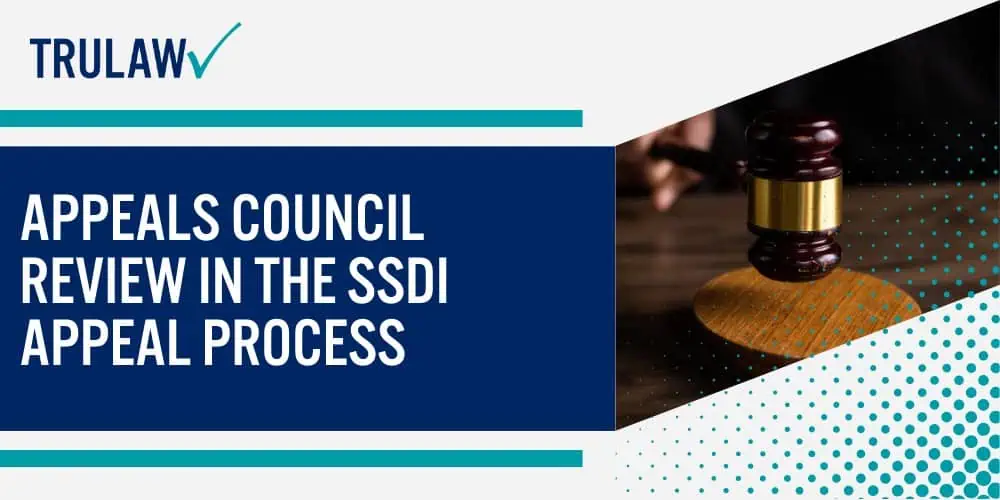
While the Council approves only a small percentage of cases outright, it may send your case back to the ALJ for further consideration if it finds errors or insufficient evidence in the original decision.
How to Request a Review by the Appeals Council
Requesting a review by the Appeals Council is an important step if you disagree with the ALJ’s decision.
By submitting a written request and providing additional evidence or arguments, you can ask the Appeals Council to reconsider your case.
To request an Appeals Council review, submit a written request within 60 days of receiving the ALJ’s decision.
Include a statement explaining why you believe the decision was incorrect and any new evidence that supports your claim.
It’s important to act promptly and provide a clear, well-supported argument for why your case deserves further consideration.
An experienced SSDI attorney can help you craft a persuasive request and ensure that you meet all the necessary requirements.
Strategies to Improve Your Chances with the Appeals Council
While the Appeals Council approves only a small percentage of cases, there are strategies you can employ to improve your chances of a favorable outcome.
By identifying specific issues with the ALJ’s decision and providing new, relevant evidence, you can increase the likelihood that the Appeals Council will grant your request for review.
Here are some key strategies to consider:
- Identifying specific errors or inconsistencies in the ALJ’s decision
- Providing new and material evidence that addresses the reasons for the denial
- Demonstrating that the ALJ’s decision was not supported by substantial evidence
An experienced SSDI attorney can help you craft a persuasive argument and handle the Appeals Council review process.
By working with a skilled legal professional and following these strategies, you can give yourself the best possible chance of success at this stage of the appeal process.
Federal Court Review as the Final Step in the SSDI Appeal Process
If the Appeals Council denies your request for review or upholds the ALJ’s decision, your final option is to file a lawsuit in federal district court.
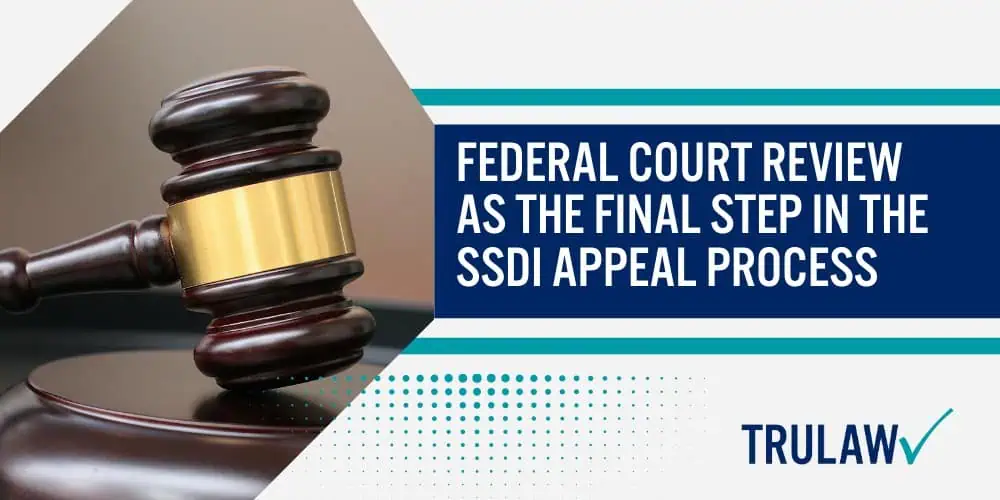
While this step can be challenging, it offers an opportunity for an independent review of your case.
When and How to File a Lawsuit in Federal Court for SSDI Denial
Filing a lawsuit in federal court requires careful consideration and preparation.
It’s important to understand the deadlines, requirements, and potential outcomes before proceeding with this step.
The process involves filing a complaint, serving the complaint and summons on the SSA, and presenting your case before a federal judge.
It’s highly recommended to seek the assistance of an experienced SSDI attorney while appealing the decision.
They will be able to help you handle the legal requirements, build a strong case, and present your argument effectively before the court.
The Role of the Federal Court in the SSDI Appeal Process
The federal court’s role is to review the SSA’s decision to ensure that it was supported by substantial evidence and that the correct legal standards were applied.
The court may affirm the decision, reverse it, or remand the case back to the SSA for further proceedings.
While the court does not make a new decision on your disability claim, it can compel the SSA to reconsider your case in light of its findings.
Common Challenges in the SSDI Appeal Process
The SSDI appeal process can be challenging, and many applicants face common obstacles that can hinder their chances of success.
These are a few common mistakes to avoid throughout the SSDI appeals process.
Mistakes to Avoid During the SSDI Appeal Process
Avoiding common mistakes is important to ensure that your SSDI appeal has the best possible chance of success.
By staying organized, meeting deadlines, and providing comprehensive evidence, you can minimize the risk of further delays or denials.
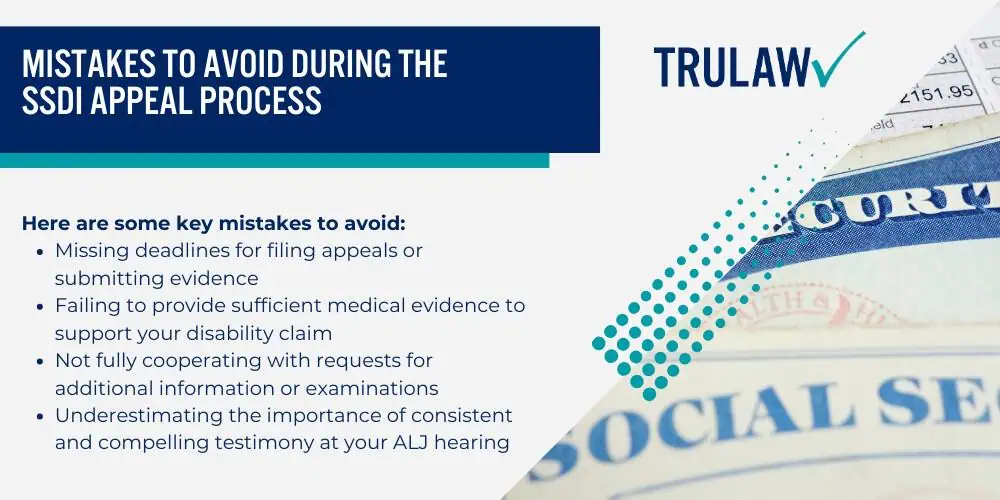
Here are some key mistakes to avoid:
- Missing deadlines for filing appeals or submitting evidence
- Failing to provide sufficient medical evidence to support your disability claim
- Not fully cooperating with requests for additional information or examinations
- Underestimating the importance of consistent and compelling testimony at your ALJ hearing
By being aware of these potential pitfalls and taking steps to avoid them, you can significantly improve your chances of a favorable outcome in your SSDI appeal.
Working with an experienced law firm can also help you handle the process effectively and avoid costly errors.
Medical Evidence and Legal Requirements of the SSDI Appeals Process
One of the most significant challenges in the SSDI appeal process is meeting the medical and legal requirements for demonstrating a qualifying disability.
This involves providing extensive medical evidence, meeting the SSA’s definition of disability, and proving that your condition prevents you from engaging in substantial gainful activity.
Working closely with your healthcare providers and an experienced SSDI attorney can help you build a strong case that meets these requirements.
Legal Assistance in the SSDI Appeal Process
Given the importance of supplemental security income, many applicants find that working with an experienced attorney can significantly improve their chances of success.
The Role of an Attorney in the SSDI Appeal Process
An SSDI attorney plays an important role in helping applicants handle the appeal process and build the strongest possible case for their disability claim.
By providing expert guidance, representation, and support, an attorney can significantly improve your chances of a favorable outcome.
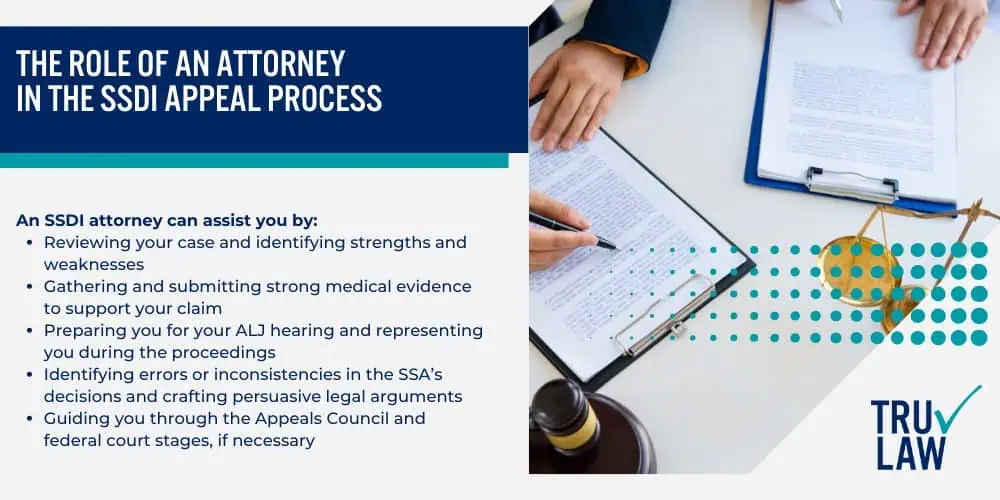
An SSDI attorney can assist you by:
- Reviewing your case and identifying strengths and weaknesses
- Gathering and submitting strong medical evidence to support your claim
- Preparing you for your ALJ hearing and representing you during the proceedings
- Identifying errors or inconsistencies in the SSA’s decisions and crafting persuasive legal arguments
- Guiding you through the Appeals Council and federal court stages, if necessary
With their expertise and support, an SSDI attorney can help you handle the appeal process and work toward a favorable resolution of your case.
If you’re considering appealing an SSDI denial, consulting with an experienced attorney is an important step in protecting your rights and maximizing your chances of success.
Legal Representation for Your SSDI Appeal
Choosing the right legal representation for your SSDI appeal is important to ensure that you have the best possible chance of securing the benefits you need and deserve.
When selecting an attorney, it’s important to look for someone with the experience, knowledge, and dedication to effectively advocate for your case.
When choosing an SSDI attorney, look for someone with extensive experience in handling Social Security disability cases, a track record of success, and a deep understanding of the medical and legal issues involved.
TruLaw offers instant case evaluations and works on a contingency basis, meaning they only collect a fee if your claim is approved.
By working with a skilled and compassionate SSDI attorney, you can ensure that your rights are protected and that you have the best possible chance of securing the benefits you need and deserve.
Don’t hesitate to contact TruLaw using the chat on this page if you’re facing an SSDI appeal – having an experienced advocate on your side can make all the difference in the outcome of your case.
Social Security Disability Insurance Frequently Asked Questions
-
The SSDI appeal process involves four main steps:
- Reconsideration
- ALJ Hearing
- Appeals Council Review
- Federal Court Review
By following these steps and providing strong evidence, you can increase your chances of a successful appeal for disability benefits.
-
To strengthen your SSDI reconsideration appeal, submit new medical evidence, ensure your records are complete and up-to-date, and provide detailed information about your limitations.
Promptly respond to any requests for additional information or examinations to improve your odds of a favorable outcome.
-
During an SSDI hearing, you’ll have the opportunity to present your case in person, answer questions from the judge, and provide testimony about your disability and its impact on your life.
The ALJ may also call vocational or medical experts to testify before issuing a written decision on your claim.
-
To request an Appeals Council review, submit a written request within 60 days of receiving the ALJ’s decision, including a statement explaining why you believe the decision was incorrect and any new evidence that supports your claim.
An experienced SSDI attorney can help you craft a persuasive request and handle the review process.
-
If the Appeals Council denies your request for review or upholds the ALJ’s decision, your final option is to file a lawsuit in federal district court within 60 days of receiving the Council’s decision.
It’s highly recommended to seek the assistance of an experienced SSDI attorney when appealing the decision in federal court.
-
An SSDI attorney can assist you by reviewing your case, gathering strong medical evidence, preparing you for your ALJ hearing, identifying errors in the SSA’s decisions, and guiding you through the Appeals Council and federal court stages if necessary.
Working with an experienced attorney can significantly improve your chances of a favorable outcome in your SSDI appeal.

Managing Attorney & Owner
With over 25 years of legal experience, Jessica Paluch-Hoerman is an Illinois lawyer, a CPA, and a mother of three. She spent the first decade of her career working as an international tax attorney at Deloitte.
In 2009, Jessie co-founded her own law firm with her husband – which has scaled to over 30 employees since its conception.
In 2016, Jessie founded TruLaw, which allows her to collaborate with attorneys and legal experts across the United States on a daily basis. This hypervaluable network of experts is what enables her to share the most reliable, accurate, and up-to-date legal information with our readers!
Additional Social Security Disability Insurance resources on our website:
Here, at TruLaw, we’re committed to helping victims get the justice they deserve.
Alongside our partner law firms, we have successfully collected over $3 Billion in verdicts and settlements on behalf of injured individuals.
Would you like our help?
At TruLaw, we fiercely combat corporations that endanger individuals’ well-being. If you’ve suffered injuries and believe these well-funded entities should be held accountable, we’re here for you.
With TruLaw, you gain access to successful and seasoned lawyers who maximize your chances of success. Our lawyers invest in you—they do not receive a dime until your lawsuit reaches a successful resolution!
AFFF Lawsuit claims are being filed against manufacturers of aqueous film-forming foam (AFFF), commonly used in firefighting.
Claims allege that companies such as 3M, DuPont, and Tyco Fire Products failed to adequately warn users about the potential dangers of AFFF exposure — including increased risks of various cancers and diseases.
Depo Provera Lawsuit claims are being filed by individuals who allege they developed meningioma (a type of brain tumor) after receiving Depo-Provera birth control injections.
A 2024 study found that women using Depo-Provera for at least 1 year are five times more likely to develop meningioma brain tumors compared to those not using the drug.
Suboxone Tooth Decay Lawsuit claims are being filed against Indivior, the manufacturer of Suboxone, a medication used to treat opioid addiction.
Claims allege that Indivior failed to adequately warn users about the potential dangers of severe tooth decay and dental injuries associated with Suboxone’s sublingual film version.
Social Media Harm Lawsuits are being filed against social media companies for allegedly causing mental health issues in children and teens.
Claims allege that companies like Meta, Google, ByteDance, and Snap designed addictive platforms that led to anxiety, depression, and other mental health issues without adequately warning users or parents.
Transvaginal Mesh Lawsuits are being filed against manufacturers of transvaginal mesh products used to treat pelvic organ prolapse (POP) and stress urinary incontinence (SUI).
Claims allege that companies like Ethicon, C.R. Bard, and Boston Scientific failed to adequately warn about potential dangers — including erosion, pain, and infection.
Bair Hugger Warming Blanket Lawsuits involve claims against 3M — alleging their surgical warming blankets caused severe infections and complications (particularly in hip and knee replacement surgeries).
Plaintiffs claim 3M failed to warn about potential risks — despite knowing about increased risk of deep joint infections since 2011.
Baby Formula NEC Lawsuit claims are being filed against manufacturers of cow’s milk-based baby formula products.
Claims allege that companies like Abbott Laboratories (Similac) and Mead Johnson & Company (Enfamil) failed to warn about the increased risk of necrotizing enterocolitis (NEC) in premature infants.
Here, at TruLaw, we’re committed to helping victims get the justice they deserve.
Alongside our partner law firms, we have successfully collected over $3 Billion in verdicts and settlements on behalf of injured individuals.
Would you like our help?

